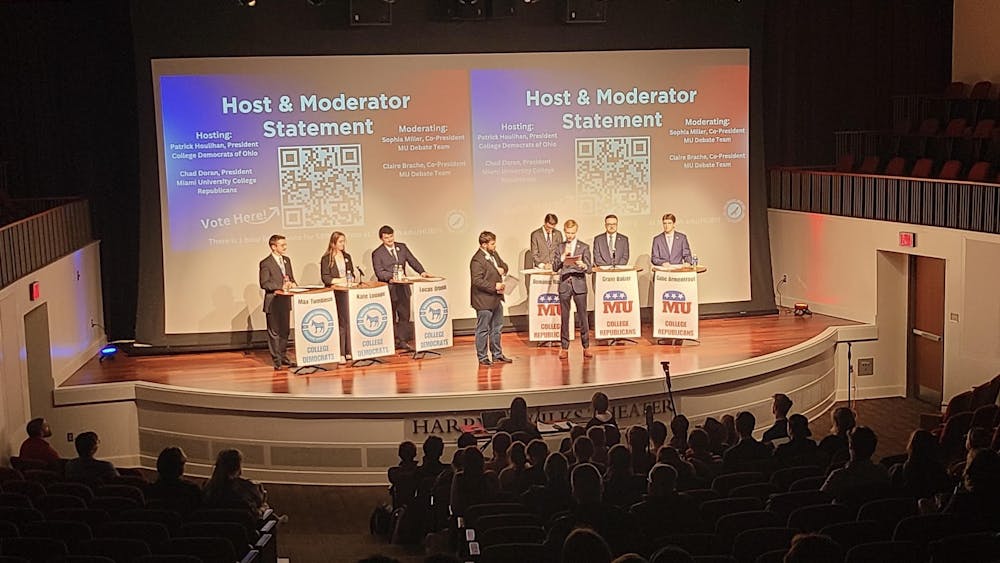Miami College Republicans and Miami College Democrats partnered with Miami’s Debate Team to host a political debate on March 20.
While the College Democrats and Republicans have had debates in the past, but have not held one since before COVID. Patrick Houlihan, a junior political science major and the president of the College Democrats, hopes to see this event continue annually.
“A lot of people on my exec board for College Democrats are freshmen, they will be able to carry this legacy on with them for at least the next three years …” Houlihan said. “And the debate club being a brilliant partner is going to be key to keeping the longevity of the event.”
Chad Doran, a junior business economics major, serves as the president of the College Republicans.
“I think the debate went well. There's one cooperation from both sides. The Republicans and the Democrats as well as the debate club,” Doran said. “We came together [and] put a lot of resources, time, thought and effort into making it the success that it was.”
The debate consisted of three members on each side with Max Tumbleson, Kate Louagie and Lucas Orlando arguing for the College Democrats, and Gabe Armentrout, Grant Balzer and Dominic Roeder arguing for the College Republicans.
The debate covered some hot-button issues in the current political climate such as climate change, the Second Amendment, presidential fitness, student loan forgiveness, systemic racism, Israel and Palestine, abortion and transgender transitions. The debate was moderated by Sophia Miller and Claire Brache, the co-presidents of the debate team.
Each party was given 90 seconds to respond to the question while the opposing party was given 60 seconds to respond. After this, an eight-minute moderated discussion ensued where each party debated their position and asked their opponents questions.
The debate began with the topic of climate change. The College Republicans took the position of expanding nuclear energy and carbon capture technologies. The College Democrats agreed with this position, however, they advocated for an increase in infrastructure, a reduction in the use of fossil fuels and for America to be a world leader in the reduction of greenhouse emissions.
When the topic of gun control came up, the College Democrats argued for universal background, training requirements, mental health checks and a closing of the gun show loophole. The College Republicans argued that these initiatives have been ineffective in the states that have implemented them. Instead, they advocated for an increase in responsibly armed citizens particularly in gun-free zones.
After the debate, both sides fielded questions from the audience about Jan. 6 pardons, Christian Nationalism, the national debt and foreign lobbying.
Eve Harvey, a junior political science major, plans to vote for the Democratic party this fall.
Enjoy what you're reading?
Signup for our newsletter
“I thought that the discussion on the Second Amendment was very interesting,” Harvey said. “It was very interesting to [hear] the perspectives from the right of what they thought about that.”
Drew Belcher, a first-year political science major and member of the College Republicans, spectated the debate and liked their arguments.
“I thought it went really well. I think both sides presented their arguments very articulately, and I'm happy to see some conversation between the two,” Belcher said.
While both sides had, at times, differing opinions, there were some moments of bipartisanship. On the topic of presidential fitness, both sides asserted that a Trump-Biden presidential race was not what they were hoping for.
“That's [presidential fitness] the looming question over the upcoming 24 presidential election, and I thought that was probably the most interesting conversation,” Belcher said.
“I think it's great that we were able to agree on a few things, a few of the fundamentals,” Doran said.“For example, the need to rein in government spending.”
Like Houlihan, Doran hopes to make this an annual event.
“In the past, there were College Republicans [and] College Democrats debates [but] that trend fell off a few years ago,” Doran said, “and it's a tradition that we'd like to revitalize here at Miami.”




